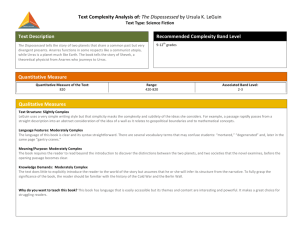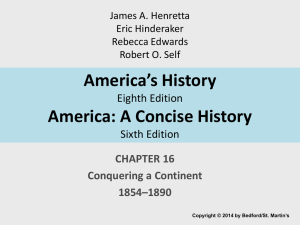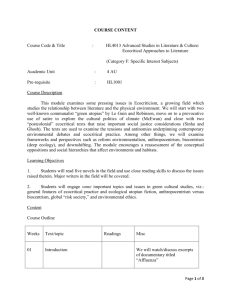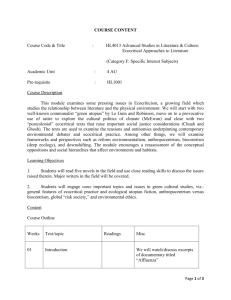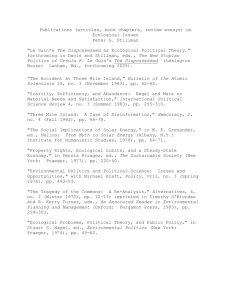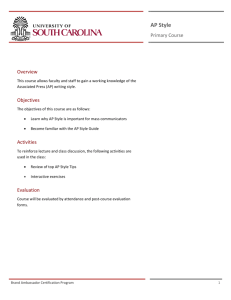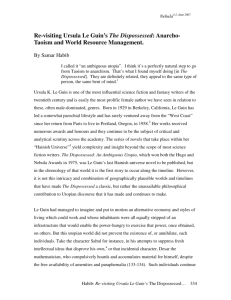The Dispossessed
advertisement
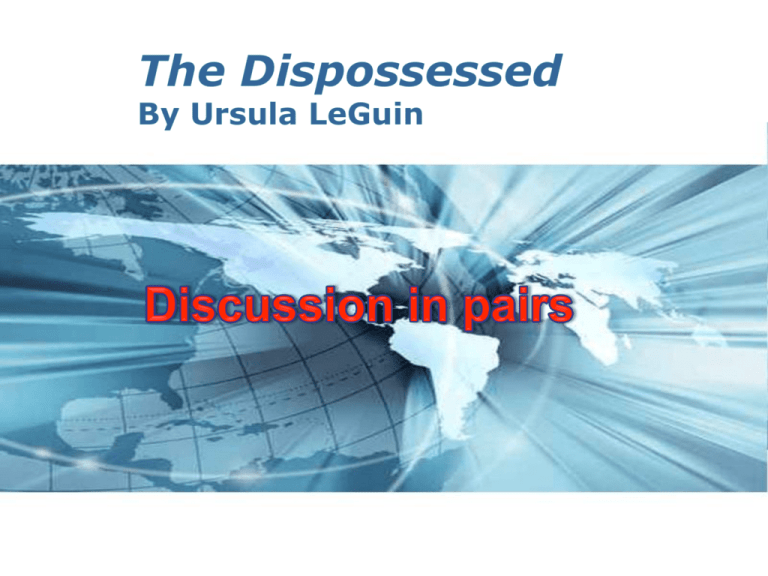
The Dispossessed By Ursula LeGuin Page 1 Chapter 1 In this chapter we are introduced to the protagonist, Shevek. He arrives at the space port on foot, he does not like the salutation ‘Dr.’, he wants to ‘unbuild walls’ in Abbenay, he believes men and women are equals, and he travels to Urras with no money or luggage. What do these and other details in this first chapter reveal about Shevek’s character? How does his character tell us about the values of the society he grew up in? What does it mean, or how does it function, to have a feminist male character as protagonist? Page 2 Chapter 2 In this chapter we see some of Shevek’s early childhood. We also learn about Odo, who is the philosophical founder of Anarres. What do we learn about anarchist ideals and values through Shevek’s childhood experiences, through their adolescent attitudes toward sexuality, through their refusal of luxuries, and through the community’s work on various labour-intensive projects, such as the afforestation project? Page 3 Chapter 3 In this chapter Shevek is on the planet Urras, and discovers many rich luxuries to which he is entirely unaccustomed. We are exposed to Shevek’s work in physics and the nature of relativity, whereby the government of Urras is hoping he will discover a mathematical model for developing instantaneous interstellar travel by mapping elements of Sequency and Simultaneity together. The cooperation of Urrasti, Anarresti, Hainish and Terran scientists seems to be in stark contrast to the notion that a competitive desire for profits is the only motivation for people to work. Discuss this contradiction. Page 4 Chapter 4 In this chapter we see more of Abbenay’s infrastructure and lifestyles. The businesses are all clustered together as they typically are in pre-industrial cities, to be accessible by foot. There are trolly-cars that are run by clean energy. People leave their doors unlocked. Explore the value system represented by these detailed descriptions of life in Abbenay. We also see Sabul exploiting or controlling Shevek and his work in specific ways. What does this reveal about the difficulties of living in an isolated, separatist society? What does it reveal about the tension between the Odonian value of non-hierarchical relationships among equals, and the way power plays out in reality? How does this compare to personal, professional and power relationships in Urras? Page 5 Chapter 5 In this chapter, we see various interactions of Shevek on Urras as different characters seek to win Shevek’s favour, from students who want good grades (Shevek refused to assign grades) to the communist Chifoilisk from Thu, who suggests he and Shevek should be allies. A debate is playing out between the material and the ideal. Shevek denies being an idealist. He also echoes the anarchist slogan, “Where there’s property, there’s theft,” or as Proudhon put it, “Property is theft.” Firstly, what does this mean—how is property theft? Who is stealing what from whom through property rights? How does the Anarres method for getting people to work hard contrast with that of Urras? Describe and evaluate the two economic systems. Page 6 Chapter 6 In this chapter, various friendships and sexual relationships are developed. Bedap and Shevek engage in political discussions about censorship and repression, and engage in a purely sexual relationship. Shevek and Takver “fall in love” though of course not in a way that we might be familiar with. Tirin is punished for failing to conform. Shevek and Takver do not get married, and their relationship allows for other partners. How does this exploration of the nuances of friendship, sexual partnerships, love, and intimacy open up possibilities for redefining relationships? What are the politics of these types of relationships and how do they relate to institutions such as culture, family, medicine, and the state? Page 7 Chapter 7 In this chapter, we see the return of the image of “the wall” which appeared in Chapter 1 and comes up again and again. What does “the wall” represent in The Dispossessed? How is Shevek changing in terms of his feelings about Anarres and Urras. How does his inadvertently alcoholsoaked sexual encounter with Vea influence this change? When he encounters the potential of an uprising or general strike, it reminds him of his original reasons for coming to Urras. Shevek’s role in the uprising is foreshadowed. What is at stake here politically and personally for Shevek, and how are the two related? Page 8 Chapter 8 This chapter deals with several problems that are developing on Anarres: Shevek’s inability to get his work published (they have freedom of the press, but only if you own a press), the drought and subsequent planet-wide food crisis, and the separation of Shevek and Takver for purposes of work. We see the politics of anarchism or Odonism being pushed to their logical limit in the food crisis, and the personal relationships also being tested at their limits. How does this compare to our current situation in times of economic austerity under capitalism where many people are out of work and others are forced to work long hours just to survive? Does it offer any solutions, as science fiction tends to function as social criticism? Page 9 Chapter 9 In this chapter, Shevek becomes disconsolate over his work, and finally decides, with help from Efor, to break out of the university grounds where he has been more or less held captive, and to contact the rebels and revolutionaries who are planning the general strike. What motivates him to do this? What are the key points in his speech and what does he mean by his conclusion? What is revealed about military organizations and how soldiers might come to be firing live ammunition on their own population? What aspects of our society are being critiqued in this chapter? Page 10 Chapter 10 Language plays an important role in revealing how the Anarresti relate to objects and each other. In a crucial passage, Sadik says to Shevek, “You can share the handkerchief I use.” How does the wording of this offering signal a different relationship to possessions, emphasizing how the Anarresti are ‘dispossessed’ not just of a planet but also of their desire to possess things and perhaps even each other? There is another crucial passage in this chapter where Shevek articulates how his responsibility is to strive toward the ideals of Odonian society, even though the society seems unable to live up to these ideals. Explain and analyze this notion of ideological responsibility in a dispossessed community. Page 11 Chapter 11 Here we encounter the Terran ambassador, Ambassador Keng, explaining her position on the situation on Terra/Earth, and differentiating it from Anarres and Urras in political, environmental and economic terms. LeGuin hereby avoids a dualistic system in which one planet can be seen to be correct, and the other, its binary opposite, incorrect in every way. When additional planets come into play, we are able to have a more nuanced understanding of the complex political systems that the various planets represent. What are some of the important differences? What are the positives and negatives of each system according to Ambassador Keng? Do you agree or disagree? What is Shevek’s response? Page 12 Chapter 12 This chapter is in some ways the inciting incident that leads to the action of the novel, which of course started back in Chapter 1. We find ourselves in a circular narrative. The debate about whether or not an Anarresti should be allowed to travel to Urras takes place, and they do not take a vote. What is the decision-making process like? Is it effective? Why might anarchists be opposed to voting, preferring consensus decision-making instead? Shevek seems unsure about the impending trip. How does this differentiate him from—or perhaps align him with— most science fiction heroes? Are these seemingly unrelated issues reflective of a resistance to binaries and/or easy answers? Page 13 Chapter 13 In this chapter we have a return to the wall image from the opening chapter. What is the significance of the ending? Which questions does the novel answer perhaps a little too easily, and which questions does it leave hanging? What is the effect of this tendency toward a postmodern resistance to closure? Page 14 Next Class • Presentation on The Dispossessed • Be sure to finish reading the novel Page 15
